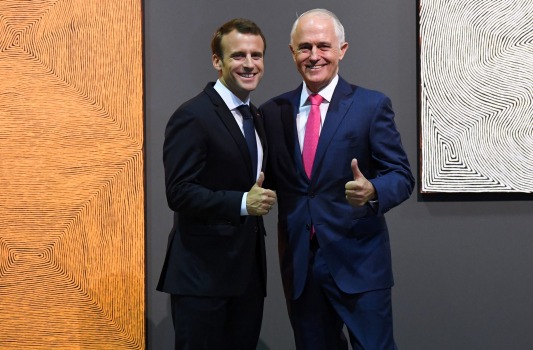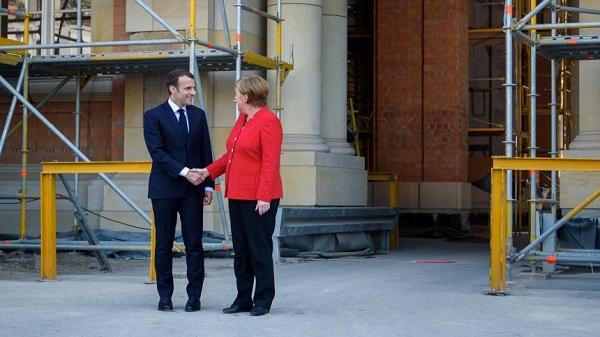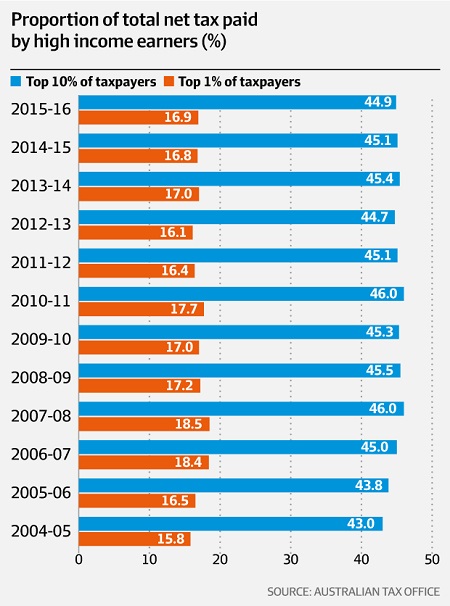1. Macron – everyone’s friend
French President Emmanuel Macron came and went.

Andrew Tillett in the AFR reports that analysts do not think that Macron’s drive for an Australia-France-India “strategic axis” for the Indo-Pacific will amount to much in the long run. You can surge but it is harder to sustain. Realistically France is peripheral to what happens in the Pacific.
Labor stands by to out-compete the Chinese in the Pacific, by getting in there and doing stuff to meet their needs.
Meanwhile Turnbull and Macron announced a surge in the $50 billion submarine project. Detailed design work will shift from France to Adelaide in 2022, creating 270 jobs.
Wow!
Macron found Lucy Turnbull “delicious”, David Rowe noticed something else:

Meanwhile Der Spiegel has done a report Sidelined: Germany’s Incredibly Shrinking Role on the World Stage, asking, Has the ‘Queen of Europe’ been dethroned?
I wouldn’t worry too much. To Merkel he’s just another bloke, but one who knows how to shake a woman’s hand:

Sophie Pedder, Paris bureau chief for the Economist, author of Revolution Française: Emmanuel Macron and the Quest to Reinvent a Nation talking to Tom Switzer has a largely positive view of him. He is enthusiastic about Europe, and wants to make France more agile – more in the manner of the Scandinavian countries. At home the French don’t like change very much and on European matters he won’t get past Merkel’s pragmatic filter.
2. Trump talks in Korea
Hugh Riminton talked to three intelligent and informed people at The Roundtable.
Bottom line is that if North Korea is to denuclearise it will want the Americans out of South Korea.
The United States has 23,468 people on duty in South Korea at 83 sites, then there are a further 39,345 troops stationed across 112 bases in Japan, plus the Seventh Fleet:
- with roughly 50-70 ships and submarines, 140 aircraft and approximately 20,000 sailors across the Indian Ocean and the Pacific.
The USS Ronald Reagan, a nuclear-powered aircraft supercarrier, is permanently deployed at Yokosuka, Japan, as the fleet’s flagship carrier.
The fleet also includes up to 14 destroyers and cruisers at any given time, some armed with ballistic missile interceptors, long-range Tomahawk land attack missiles and anti-aircraft missiles. Up to 12 nuclear-powered submarines are also available.
That’s a bit threatening in anyone’s language.
The worry is that Trump will want an outcome. What the Koreans want (North and South) is the beginning of a process that might take 6-10 years.
3. Gonski fail?
At the AFR Jennifer Buckingham said:
-
The highly anticipated Gonski 2.0 report offers little useful guidance for schools and school systems, and does not even meet important terms of reference set down for the review.
Then:
- Unfortunately, the recommendations in the second Gonski report are not based on evidence about effective use of school resources. Most are inane and obvious – for example, children who learn more in a year at school will have higher achievement. Yes, really … it is surprisingly at that useless level.
And the recommendations that do represent a departure from the status quo have several significant problems. The proposals are not supported by research, they lack detail about implementation, and overall they will significantly increase the level of complexity and bureaucratisation of the school system.
At the SMH with Blaise Joseph she says:
- The report released yesterday does not meet this brief. The report is more of a manifesto than a blueprint. It does not provide any guidance for how schools or school systems should spend the extra Gonski 2.0 money to improve student results.
It is full of generalities and a head-spinning number of platitudes. And it certainly does not include any comprehensive analysis of the costs and benefits of its recommendations. In short, it contributes very little to the education policy debate in Australia.
At The Spectator Australia she advises Simon Birmingham Cut the losses on Gonski 2.0 review and quietly back away.
At The Conversation reaction is largely positive, though some say Gonski is a bit yawn-worthy, recommending what is already being done, for example in ‘democratic schools’.
I’d like to have a yarn with someone who is more in touch with schools these days. I worry about the workload of doing individual planning for the 100 or more students who teachers meet each day in a large secondary school.
I heard talk about grouping according to ability rather than age. Perhaps Gonski doesn’t know that the academic program is only half the deal in educating the young.
There was also talk about payment by results for teachers, which will go down a treat.
Robert Bolton in the AFR says Gonski’s idealism is hard to implement and his solutions unrealistic.
- Personalised teaching is not going to fly according to John Hattie, chair of the Australian Institute for Teaching and School Leadership. One-on-one, tailor-made classes are an idea that’s been around for 20 years but Dr Hattie says no teacher in the world has time for an individualised program. A one-time advocate for it himself, Hattie now wishes he’d never used the words.
“Parents love it, it sounds like it is just for their child. But teachers need to teach on a collective basis.”
Back in the 1980s I saw a high school that was providing extension work for bright kids, and special teaching for those struggling, while keeping them basically in their age cohorts with their mates. They called it ‘competency-based education’.
State education ministers only saw Gonski’s report a few days before it was released. It will be considered at their next meeting (August, I think). The basic problem is that there are spruikers, Jennifer Birmingham among them, who say extra money won’t help, whereas the people actually do the teaching know that the LNP has not put back all the money they took out of ‘Gonski’ and it matters.
4. Greens tax proposals
The Greens tax proposals have some useful information and ideas. For example:
- “Despite what the Liberals say, Australia is a low taxing nation. It is the 8th lowest-taxed among the 35 OECD nations. Australia’s combined tax-to-GDP ratio is 28.2% for all levels of government in 2015. The OECD average is 34%.
“If Australia collected the same amount of tax as the average OECD nation then we would need to collect an additional $94 billion per year”.
The LNP has ruled an arbitrary line which says that Commonwealth Government receipts shall not be more than 23.9 per cent of GDP.
They have also abandoned their previous rule that we need a surplus of one per cent of GDP to make us a bit shock-proof from a major black swan event in the world financial system. “Debt and deficit” have given way to tax cuts to drive “jobs and growth”. And “You’ll pay more under Labor” – $200 billion more (over 10 years). Actually you’ll pay less unless you are rich, as Labor will have more to compensate low and middle income earners.
Labor’s extra revenue amounts to around $20 billion a year, not a lot when receipts are getting up near half a trillion. That’s nowhere near the OECD average. Here’s what the Greens would do:
- First, they would bring in “a Buffett rule” to ensure higher income earners paid their fair share of tax by limiting deductions made by those earning more than A$300,000. That would raise $9.5 billion over the forward estimates.
- Another $14.3 billion would come from targeting property investors, with the capital gains tax discount phased out over five years, and negative gearing scrapped for future purchases and phased out for multiple properties.
- Trusts would be taxed as large corporations, at a 30% rate, raising $3.8 billion over the forward estimates.
- They have put forward measures to target corporate tax avoidance, saying it is estimated corporations avoid about $8 billion of tax a year.
- Finally, they advocate changes to the petroleum resource rent tax, ending fossil fuel subsidies, mainly paid to multinational mining companies, and the introduction of a mining super profits tax at a rate of 40%. And no reduction in corporate tax rates.
Here’s the tax burden share of the top 10% and top 1%:

Hasn’t changed much over 10 years. I’m sure an extra 2% on their tax rate won’t cramp their life-style.
5. Is money evil?
Waleed Aly and Scott Stephens ask the question at The Minefield along with Gordon Menzies, who is Associate Professor of Economics at the University of Technology Sydney.
The short answer, is no, not as such, but the love of money is the root of all evil.
-
For the love of money is a root of all kinds of evil. Some people, eager for money, have wandered from the faith and pierced themselves with many griefs.


Before lunch my bro rang me up to see whether there was a crisis in my life because the new Salon had not appeared. That slowed me down by about 30 minutes!
I meant to add that the ScoMo/ Turnbull/Cormann attitude to limiting expenditure means they get in a fix like the Environment Department is about to lose 60 positions from its biodiversity division, about a third of its staff and half its funding while even now one third of our 548 endangered species are not being monitored.
That’s while we boost support to craft beer makers, and top up the Location Offsets to the film industry with an extra $140 million.
5/4? 4/5?
Maybe it’s May.
M’aidez!!
A
PAnon
5/5, now fixed, thanks Ambi.
Beer tax on craft brewers to be levelised. As Brian says, a bizarre feature of tax law – why would keg size matter to the tax rate. If it was an environmental policy to reduce packaging maybe there is an argument???
I don’t think the government is boosting the craft brewers, rather they are removing an inequity that has favoured the larger brewers. The tax rates can be found here:
http://law.ato.gov.au/atolaw/view.htm?rank=find&criteria=AND~attracts~basic~exact&target=Y%20YB&style=html&sdocid=SAV/ALCOHOL/00011&recStart=1&PiT=99991231235958&recnum=4&tot=8&pn=ALL:::YB
I apologise for offering the most convoluted “authority” known to Mankind.
Labor may claim credit for the idea but who set the difference in the first place? And why? Was it a push-back by the alcohol giants to protect their tired watery brews? Jumpy should know, it was likely a relic of some neo-liberalism generated by the post-colonial surge of nationalism following the end of WW2.
How much differenc will it make to the price of a glass anyway? That is pretty hard to work out if you read the link. The tax difference on the alcohol content over 3.5% is $22.88 per litre of alcohol. Therefore, if beer is 5% you need 20 litres of it to get your single litre of alcohol (0.05 x 20 += 1). A “middy” in NSW is 285ml, so thats near enough to 70 middy’s out of 20 litres, so a middy costs an extra 32.7 cents because of the anomally. (Someone please check my math. )And it will change with the next excise increase.
Anyway, apparently they will change the system, craft beer will be cheaper because of course, the brewers will pass on the new tax rate… but it does not take effect for 12 months and by then the drinkers will have forgotten about it, and/or the tax would be indexed up anyway. Why it takes 12 months I don’t know, they can change fuel excise overnight.
Geoff H
You are a True Friend of beer drinkers and have no need to apologise for anything!
Turnbull government announces a review of Australia’s fuel reserves amid warnings that conflict in the Middle East or South China Sea could disrupt supply and threaten record-low domestic emergency stocks.
Josh Frydenberg has an op-ed in today’s SMH, link here.
The sooner Australia transitions away from petroleum oil dependency, the more energy secure we will be.
True enough Geoff M.
That places emphasis on electrified transport, especially cars and transport – rail and truck.
There are concerns that Tesla might be somewhat over-extended and could face Chapter 11 this year.
https://www.businessinsider.com.au/how-tesla-could-go-bankrupt-2018-5
There are other views that suggest Tesla is too important to fail (like the banks?). And there are other companies developing electric vehicles.
BTW, I went to the (electrically powered) cinema yesterday and saw: “The Guernsey Literary and Potato Peel Pie Society” My wife played the trailer at home and sorta shamed me into going. I expected a corny useless film but I was wrong. My wife was right, it turned out to be a great film and I would urge all to consider it.
Geoff Henderson (Re: MAY 7, 2018 AT 12:39 PM):
Indeed, but that requires more electricity generating capacity. And we have ignoramuses in Canberra and elsewhere (closer to home) that won’t listen to “experts” and think it’s a good idea be building more coal-fired capacity. Meanwhile Australia’s electricity generator fleet ages.
But no one wants to deal with the issue of ‘peak oil’, or more importantly plan for a ‘post-peak oil’ world. I think many people are unable to comprehend a world without petroleum – either we plan now for it’s inevitable decline, or we face a rude shock in the not too distant future (probably before 2030, and a risk before 2020).
At CleanTechnica is this article headlined China Study Warns Of Impending Oil Production Peak & World Oil Market Squeeze, + Peak Recoverable Coal ~2020, link here.
Whether Tesla survives or fails, it has shown what’s possible – that’s probably more than half the battle. Once people know it can be done then it’s a case of copying the tech, and/or improving/refining on it.
Governments need to balance the need to get important things done properly, controlling debt and the alleged damage of excessive taxes. At the moment too many things aren’t being done properly because of a government obsession with private is best and pressure from their richer donors. Setting tax:GDP ratios looks like a government that is too lazy to sort out what really need to be done.
Apropos of the date,
over at The Guardian Australia First Dog on the Moon has a wonderfully nostalgic look at the magic of Budget Eve.
Most people I hear of, who are waiting now for the price of a family sedan EV to drift down, have in mind to install rooftop solar pv and batteries to power their EV when the time comes. Self-sufficient. (The embodied energy, perhaps not home-made.)
So coal-burning grid power isn’t in their car-running plans, Geoff M at 5.19pm above. They won’t be requiring more coal combusted on their account.
My hope is that the energy guzzling TESLA tank isn’t what the future of cars is all about. Two reason:
1. Accident avoidance technology has reached a point where cars of the near future, if not already, no longer need to be heavy tanks designed for accident survival.
2. Almost all car commutes in Brisbane are done in family tanks running with driver only. We need much narrower, lighter cars to do most of the daily commutes as well as covering most trips for couples without live in children. Once again very low energy.
Ben Oquist in the AFR and on the TV tonight we had the origin of revenue at 23.9% of GDP. It was the average after the GST was introduced to the end of the Howard/Costello years.
Since then we have had the aging of the population, new and costly drugs and medicine, proper funding of education (Gonski) the NDIS and more. So ScoMo wants to tie himself in knots rather than meet people’s needs and pay down government debt.
Pre budget Essential Report had Labor leading the 2PP 53/47, the level it has been for months.
Interesting figures: Only 18% thought the budget would be good for them personally and that 55% thought that it would be good for those who are well of compared with 24% for average working families, 20% for older australians and 19% for younger Australians.
Yes John
Lower the mass of the vehicle and its kinetic energy decreases proportionately until passenger + driver masses become consequential.
Smaller cars, lower air resistance energy losses.
Win, win.
I think I might wait for Shorten’s budget reply tomorrow before doing anything on the budget. The centre piece seems to be a cup of coffee plus a treat per week for low to middle income earners, except that you don’t get anything at all until you put in your tax return next year.
We are also supposed to sign up to a plan for a flat tax in seven years time, to cost $140 billion, without knowing what the world will be like then.
The really poor, the unemployed and the homeless don’t matter.
Nor does climate change, but the ABC needs to shed $84 million so we can help craft beer makers.
I’ve finished AEMO’s fast track electricity plan, which I’ve been working on for a while. I think it is actually quite important.
Key, Wilson, Lamb, Sharkey
resigning from Federal Parlt.
Keay
not “Key”
But..but.. the vetting process was strict and Shorten was confident !!
What’s that now, a dozen or more ?
These are the people that decide what penalties we suffer for not filling out forms properly.
I’ve got 15 so far, and a few others need looking into.
Change the Electoral Act; come up with a form of words that can pass HoR and Senate with overwhelming support.
There you go: fixed.
It’s the Constitution.
Needs a Referendum to change it.
Good luck with that.
One thing Government could do is mandate all potential candidates apply to the Electoral Commission for a pass before pre-selection.
There’s plenty of time. It’s not as though the decision to run for parliament is made overnight, most of them have had that ambition for years ( particularly big party Senators )
If that’s deemed by the Court as sufficient “ reasonable steps “ then they can keep their snouts in the trough.
Yes it’s in the Constitution, but I’ve heard some lawyers say the problem could be sorted through the Electoral Act.
Can’t supply details. Sorry.
Can’t remember, it was on radio when Mr Joyce was facing his by-election. (Haven’t heard much from him since last Dec. “The band is back together!”, M. Turnbull.)
Section 128.
Brian:, Just on Gonski 2.0:
Individual plans should not be a problem at all – but a badly planned system for individual plans is likely to be a big problem.
Individual care plans for patients in hospitals has been the go for many decades. However, when lawyers became involved with the format of individual patient care plans and patient notes, (mainly to avoid litigation against hospitals) they became a nightmare to use as well as creating actual hazards for patients, because the nurses now spend an excessive amount of time at the desk and too much time away from their patients.. Contrary to the intent of the lawyer-influenced system, many incidents, some fatal, may well have been prevented had the nurse been within sight and sound of the patient instead of at the desk.
There are a lot of teachers who are nurses too and I don’t blame them for fearing that the litigation-avoidance syndrome may well infect schools too. But, carefully designed and very flexible individual student plans should prevent the infection of schools by this nasty, time-wasting disease.
GB: Individual programs would be practical if it is accepted that the bulk of the programs would be essentially the same with perhaps minor differences to take account of individual quirks. This would leave a few individual programs for those that are seriously behind or seriously ahead. Even in these cases a large slab may be standard bits for the above class of students.
In reality I expect most good teachers would have programs that take some account of differences.
Congratulations to the guardians and practitioners of Malaysian democracy.
You are a stand out in South East Asia!!!
Merdeka!!
Ambi – early days yet I think. Sixty years of one government leaves room for a lot of old eddies and currents in the politic and enforcement.
I’m just a little uneasy – for no objective reason – that the changeover might be a little bumpy.
yes J, 128.
Fair points.
But the fact of the victory is amazing after these six decades.
I’m not endorsing the recalcitrant
PM -elect.
Cheers
Yes Keating was pissed that Dr. M did not want to attend an APEC meeting. Keating liked to take credit for the birth of APEC but as far as I can tell it was Hawke in 1989 in Seoul who proposed the idea. Keating was apparently there and is credited with making a yearly event of it – I think that’s how it went down.
Expepect Mo to be a little more recalcitrant at 92 years old..
On TV tonight an ABC reporter said MM will ask for a Royal Pardon for the convicted, jailed sodomite AI, and if granted will make Anwar PM.
Considering how Deputy PM Anwar was first convicted, that would have to be the most unrecalcitrant act one might imagine.
Go Mo!
Geoff,
At least Mr Keating saying “recalcitrant” had journalists diving for dictionaries. An unusual act on their part, but one I’d like to encourage them in.
🙂
Yet dictionaries matter little to journalists still….
I’m obviously a happy recalcitrant 🙂
Not sure Mo, in freeing a Law breaker, is being “ unrecalcitrant “ at all.
But I’m, as always, eager to learn.
He would be failing to recognise the Supremacy of The Law.